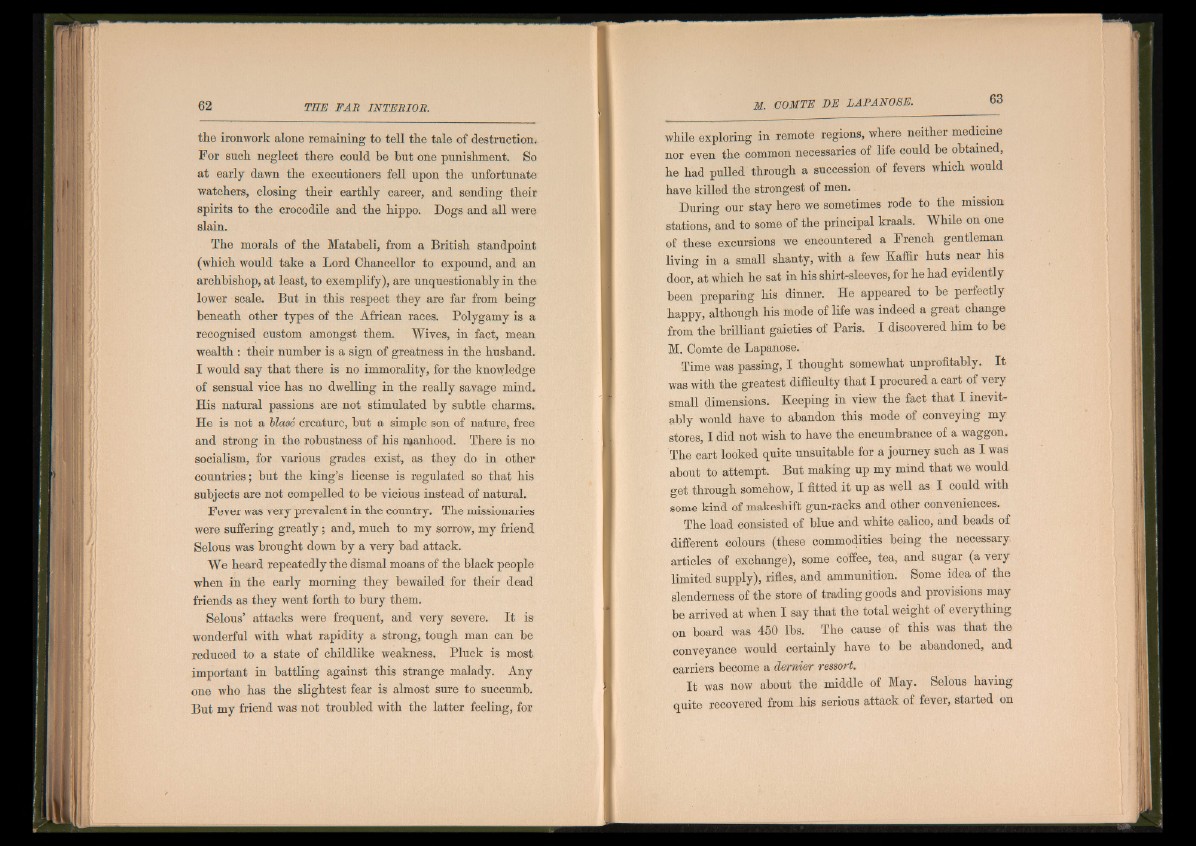
the ironwork alone remaining to tell the tale of destruction*
For such neglect there could he hut one punishment. So
at early dawn the executioners fell upon the unfortunate
watchers, closing their earthly career, and sending their
spirits to the crocodile and the hippo. Dogs and all were
slain.
The morals of the Matabeli, from a British standpoint
(which would take a Lord Chancellor to expound, and an
archbishop, at least, to exemplify), are unquestionably in the
lower scale. But in this respect they are far from being
beneath other types of the African races. Polygamy is a
recognised custom amongst them. Wives, in fact, mean
wealth : their number is a sign of greatness in the husband.
I would say that there is no immorality, for the knowledge
of sensual vice has no dwelling in the really savage mind.
His natural passions are not stimulated by subtle charms.
He is not a blase creature, but a simple son of nature, free
and strong in the robustness of his manhood. There is no
socialism, for various grades exist, as they do in other
countries; but the king’s license is regulated so that his
subjects are not compelled to be vicious instead of natural.
Fever was very prevalent in the country. The missionaries
were suffering greatly; and, much to my sorrow, my friend
Selous was brought down by a very bad attack.
We heard repeatedly the dismal moans of the black people
when in the early morning they bewailed for their dead
friends as they went forth to bury them.
Selous’ attacks were frequent, and very severe. I t is
wonderful with what rapidity a strong, tough man can be
reduced to a state of childlike weakness. Pluck is most
important in battling against this strange malady. Any
one who has the slightest fear is almost sure to succumb.
But my friend was not troubled with the latter feeling, for
while exploring in remote regions, where neither medicine
nor even the common necessaries of life could be obtained,
he had pulled through a succession of fevers which would
have killed the strongest of men.
During our stay here we sometimes rode to the mission
stations, and to some of the principal kraals. While on one
of these excursions we encountered a French gentleman
living in a small shanty, with a few Kaffir huts near his
door, at which he sat in his shirt-sleeves, for he had evidently
been preparing his dinner. He appeared to be perfectly
happy, although his mode of life was indeed a great change
from the brilliant gaieties of Paris. I discovered him to be
M. Comte de Lapanose.
Time was passing, I thought somewhat unprofitably. It
was with the greatest difficulty that I procured a cart of very
small dimensions. Keeping in view the fact that I inevitably
would have to abandon this mode of conveying my
stores, I did not wish to have the encumbrance of a waggon.
The cart looked quite unsuitable for a journey such as I was
about to attempt. But making up my mind that we would
get through somehow, I fitted it up as well as I could with
some kind of makeshift gun-racks and other conveniences.
The load consisted of blue and white calico, and beads of
different colours (these commodities being the necessary
articles of exchange), some coffee, tea, and sugar (a very
limited supply), rifles, and ammunition. Some idea of the
slenderness of the store of trading goods and provisions may
be arrived at when I say that the total weight of everything
on board was 450 lbs. The cause of this was that the
conveyance would certainly have to be abandoned, and
carriers become a dernier ressort.
I t was now about the middle of May. Selous having
quite recovered from his serious attack of fever, started on